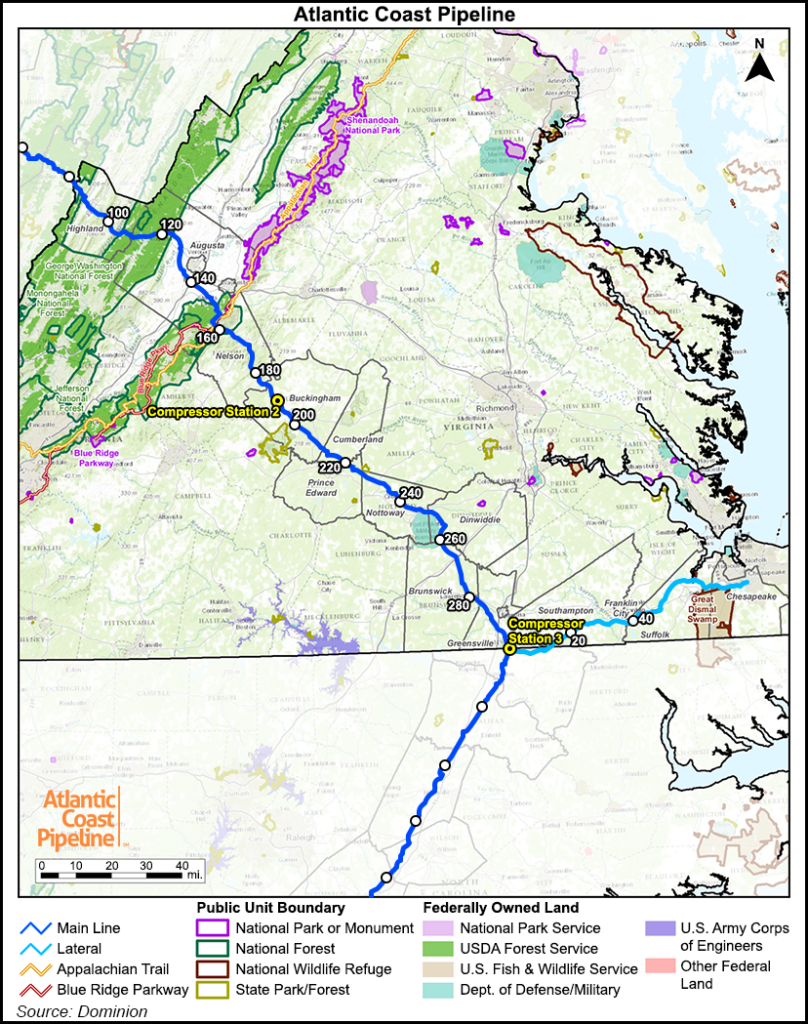Infrastructure | NGI All News Access | NGI The Weekly Gas Market Report
VA Lawmakers Write in Support of Atlantic Coast Pipeline
A bipartisan group of more than 30 Virginia state lawmakers has come out in support of the proposed Atlantic Coast Pipeline (ACP), saying the project would “be a major step forward in promoting” Virginia’s “economic and environmental health.”

In a letter to U.S. Sens. Mark Warner (D-VA) and Tim Kaine (D-VA), the lawmakers, representing districts in the eastern part of Virginia and referring to themselves collectively as the Hampton Roads Caucus, wrote that “the need for this project is urgent” and that the “region’s natural gas transportation system has reached a tipping point.”
A lack of infrastructure has constrained gas supply to Virginia cities like Hampton Roads and Chesapeake, they wrote, raising reliability concerns and limiting growth potential for the region despite “the abundant, economical supplies of natural gas being produced just a few hundred miles away” in the Marcellus and Utica shales in Pennsylvania, West Virginia and Ohio.
The lawmakers argued that without more access to natural gas the region’s economic development would be hampered.
“Hampton Roads boasts many advantages…that make it attractive to new businesses. But we face a significant, and at times crippling, disadvantage: inadequate access to natural gas. Modern industry is heavily dependent on this fuel source,” they wrote.
ACP spokesman Aaron Ruby said the letter from the Hampton Roads Caucus provides “a strong indication of the broad and bipartisan support the project has received across Virginia.”
ACP, which submitted its application to the Federal Energy Regulatory Commission last fall, has also been endorsed by the governors of Virginia, West Virginia and North Carolina (see Daily GPI, Sept. 18, 2015), as well as numerous businesses and economic development groups.
Designed to bring Marcellus and Utica gas to markets in the Southeast, the 550-mile, 1.5 Bcf/d ACP is a joint venture between Dominion, Duke Energy, Piedmont Natural Gas and AGL Resources. The 42-inch diameter pipeline would begin in Harrison County, WV, and travel through Virginia before forking into a 36-inch diameter line running through North Carolina and a shorter 20-inch diameter line running to the Hampton Roads area.
Like many interstate pipeline projects proposed in response to production growth in the Appalachian Basin, ACP has drawn vocal opposition from environmental groups and a number of landowners along its route. All of this comes as opponents of hydraulic fracturing and fossil fuel extraction have turned FERC’s interstate pipeline review process into an ideological battleground (see Daily GPI, Dec. 1, 2015).
ACP — along with the Mountain Valley Pipeline, another West Virginia/Virginia transmission project on a similar regulatory timetable — has led to increased scrutiny of a 2004 state law that allows natural gas companies to survey for projects in certain cases where the landowner has refused to grant permission (see Daily GPI, Feb. 4).
The Supreme Court of Virginia recently upheld the law’s constitutionality by refusing to hear an appeal of a lower court’s ruling (see Daily GPI, March 9), and efforts to repeal the law have stalled in the Virginia General Assembly (see Daily GPI, Feb. 10).
© 2024 Natural Gas Intelligence. All rights reserved.
ISSN © 1532-1231 | ISSN © 2577-9877 | ISSN © 1532-1266 |
